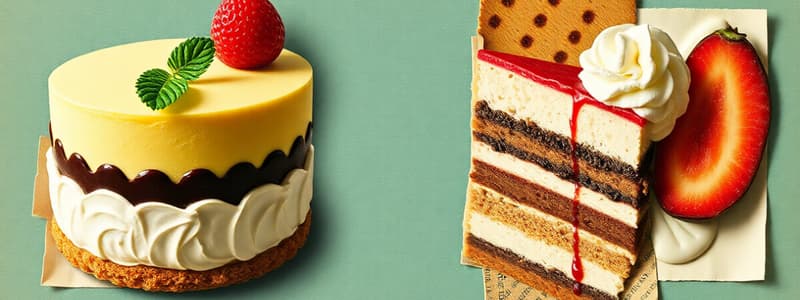Podcast
Questions and Answers
What should be considered when selecting the main element of a plated dessert?
What should be considered when selecting the main element of a plated dessert?
- The time required to prepare it.
- Its shape and serving size. (correct)
- Its geographical origin only.
- Its color and surface texture only.
How does the number of elements on a plate affect portion size?
How does the number of elements on a plate affect portion size?
- The number of elements has no impact on portion sizes.
- Fewer elements decrease visual appeal.
- More elements mean larger portion sizes.
- More elements require smaller portion sizes. (correct)
What should be evaluated to ensure a suitable flavor profile for a dessert?
What should be evaluated to ensure a suitable flavor profile for a dessert?
- The geographical origin of the ingredients.
- The type of accompaniments or garnishes. (correct)
- The color of the serving plate.
- The temperature of the serving plate.
What is an effective way to enhance visual appeal in dessert presentation?
What is an effective way to enhance visual appeal in dessert presentation?
What should be paired with a warm dessert for an appetizing experience?
What should be paired with a warm dessert for an appetizing experience?
Flashcards
Main Dessert Element
Main Dessert Element
The main element of a plated dessert, like a slice of cake or a molded dessert. Consider its shape, as it can guide the plate's composition.
Portion Size
Portion Size
The size of the dessert portions should be balanced with the number of elements on the plate. More elements mean smaller portions.
Plate Selection
Plate Selection
Matching the plate's size, shape, and color to the dessert helps create a visually appealing and cohesive presentation.
Accompaniments & Garnishes
Accompaniments & Garnishes
Signup and view all the flashcards
Textural Harmony
Textural Harmony
Signup and view all the flashcards
Study Notes
Plated Dessert Design Principles
-
Main Element Selection: Choose the core item (e.g., tart, cake slice, molded dessert). Consider the shape to match the plate. Shapes can include round, oval, square, rectangular, triangular, or irregular.
-
Portion Size: More elements mean smaller portions per item for balance.
-
Plate Selection: Plate size, color, and shape should complement the dessert's characteristics.
-
Flavor Harmony: Identify the main element's flavor profile. Select accompaniments or garnishes that enhance or contrast with the primary flavor.
-
Texture Contrast: Smooth or creamy items should be paired with chewy or brittle elements. Avoid overly monotonous textures and too many textures.
-
Visual Harmony: Consider the colors and textures of all components. Balance visual elements.
-
Temperature Contrast: Warm desserts (pie, tart) are often paired with cold garnishes (whipped cream, ice cream). Chilled or room temperature desserts can also benefit from hot garnishes.
-
Flavor Evaluation: Taste each element as a whole to assess if the resulting flavor profile is balanced (sweetness/heaviness), and if the number of flavors is appealing (odd numbers generally preferable).
-
Arrangement: Rearrange dessert components to best express the flavor concept.
Studying That Suits You
Use AI to generate personalized quizzes and flashcards to suit your learning preferences.




